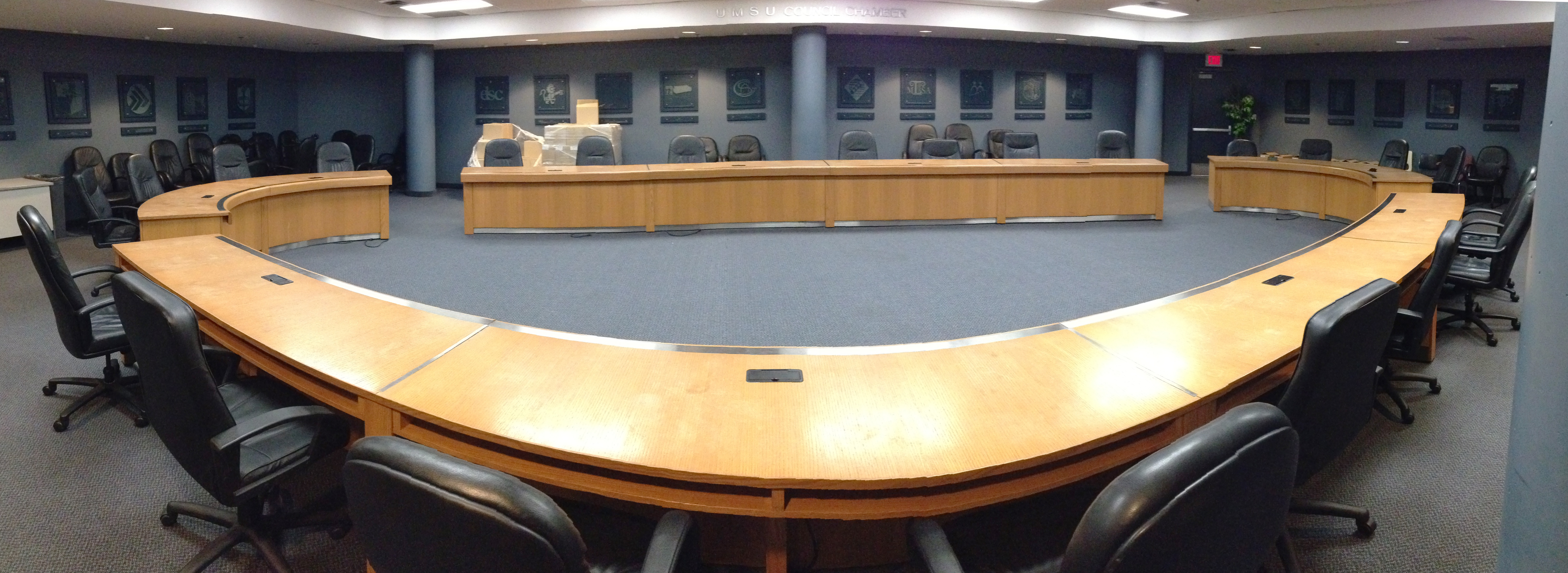The creation of an anonymous executive oversight committee was included in changes to the University of Manitoba Students’ Union (UMSU) governing documents adopted at UMSU’s regularly scheduled council meeting Nov. 24.
The oversight committee will be made up of three randomly selected UMSU councillors as well as three students-at-large, randomly selected from all those who apply.
According to the 22-page document detailing the reforms, the committee will ensure executives are investigating union members’ complaints, meeting workload commitments, and sending reports to UMSU council, among other day-to-day operations.
Members of the executive oversight committee will remain anonymous and their operations will be confidential: meetings will be held in closed session, reports and other communication outside the committee will be via email, and meeting minutes will only be distributed to committee members.
The committee will submit written term reports to be presented to UMSU council four set times a year, at the end of what are described as “assessment terms.”
UMSU president Tanjit Nagra explained why she supported the creation of the anonymous committee but noted that she did not take an active role in advocating for it, as she felt it was a “conflict of interest.”
“What we’ve seen in the past couple of years is some executive members that have been phenomenal and some that have not been the best with their work ethic in terms of their outputs and what they’re actually doing for the students,” Nagra said.
“So the biggest part of this committee is to have people who aren’t internal in the office, but a group of people that are able to oversee what exactly the executives are doing, their actual progress,” she said.
UMSU governance committee chairperson Cole Kubay said he proposed the formation of the oversight committee in consultation with the governance committee with help from UMSU governance coordinator Chris Struc.
Kubay also explained why the governance committee felt it was important for the executive oversight committee to remain anonymous.
“We didn’t want the people on the committee to be persuaded or bribed or anything by other members [of council],” he said. “We were just worried that people would be influenced.”
Kubay also said that based on how well the committee works next year, the governance committee will recommend that UMSU council re-evaluate the merits of keeping the panel and its members secret.
“Basically, every aspect of the committee will be up for review after the end of the year to see if it’s functioning as it should,” Kubay said. “We’re keeping it so that there’s anonymity unless council deems that there shouldn’t be.”
That recommendation is not included in the actual governance changes and is to be introduced to council by the governance committee separately, according to Kubay.
The oversight committee will also handle complaints against executive members.
The committee may deliver citations to any executive member in response to a complaint. Approved citations may be appealed, and these appeals are to be handled by the judicial board.
Examples of what citations may be given for include inadequate time in the office and/or conducting UMSU-related business, improper “office decorum,” actions determined to be detrimental to the union, and violation of governing documents or procedures.
However, the judicial oversight committee can review the minutes and other relevant documentation in the case of appeals.
Performance incentives
The executive oversight committee will also have the power to award “performance incentives” to union executives based on “various performance assessment criteria” that are not specified in the documents.
The committee can award up to $500 to each executive at the end of each assessment term and up to $1500 at the end of the year.
Kubay said that money is not additional; it will come out of each executive’s pre-determined salary, created by the finance committee each year.
“There’s parts of it that are vague and they have to be vague because there’s so little that we’ve done with this,” he said. “We don’t know how it’s going to run and sometimes you really can’t plan for circumstances.”
Other changes
The reforms passed at the Nov. 24 council meeting also include the creation of a judicial board.
The judicial board will oversee and deal with matters related to elections and examine appeals that must be reviewed by a third party.
If a motion passed by UMSU has violated a clause in the UMSU bylaws or the union’s election and referendum manual, it can be appealed within 30 days. If determined valid, appeals will be considered in a closed meeting of the judicial board.
The judicial board is to be comprised of three members of UMSU council and five students-at-large to be selected by the UMSU selections committee. Union executives may not sit on the judicial board and the chairperson must be a student-at-large.
The judicial board will only meet when an appeal is brought forward.
To make quorum there must be six voting members in total present.
UMSU council may not overturn any decisions made by the judicial board.
Both the judicial board and the executive oversight committee will be allowed access to the confidential executive committee meeting minutes.
Another notable change included in the reform package is the removal of the UMSU boycott list. The list allowed UMSU to boycott companies as well as goods originating from a country on the list. According to the report, the list was lost years ago and has not been seen since. The contents of the list are unknown.
The executive position of vice-president internal, currently held by Adam Pawlak, will also change to vice-president finances and operations.
The governance reforms were passed unanimously by council.
Changes to the UMSU governing documents will take effect May 1, 2017.
Correction: The article originally stated that consultation for the executive oversight committee proposal included input from past governance committee chairs and UMSU governance assistant Mark Stewart. In reality, the most recent governance committee chair gave feedback for the union’s governance changes in general at the end of his term, but not the executive oversight committee proposal specifically. Stewart did not contribute to the proposal.





